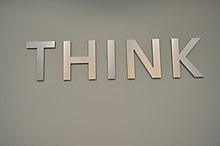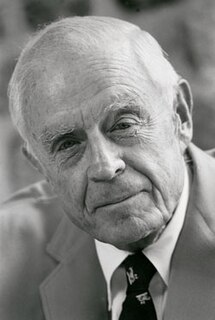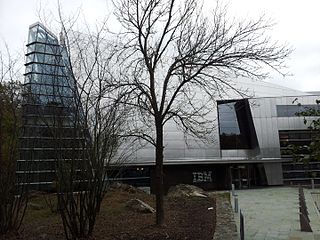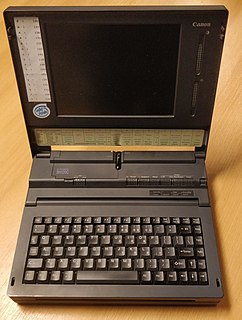 IBM Think sign | |
| Product | |
|---|---|
| Release date(s) | 1911–present |
"THINK" is a slogan associated with the American multinational technology company IBM.
 IBM Think sign | |
| Product | |
|---|---|
| Release date(s) | 1911–present |
"THINK" is a slogan associated with the American multinational technology company IBM.
The "THINK" slogan was first used by Thomas J. Watson in December 1911, while managing the sales and advertising departments at the National Cash Register Company. [1] At an uninspiring sales meeting, Watson interrupted, saying "The trouble with every one of us is that we don't think enough. We don't get paid for working with our feet — we get paid for working with our heads". Watson then wrote THINK on the easel. [2]
Asked later what he meant by the slogan, Watson replied, "By THINK I mean take everything into consideration. I refuse to make the sign more specific. If a man just sees THINK, he'll find out what I mean. We're not interested in a logic course." [3]
In 1914, Watson brought the slogan with him to the Computing-Tabulating-Recording Company (CTR) and its subsidiaries, all of which later became IBM. [4] [5] [6] [7] International Time Recording, one of the subsidiaries, published a magazine for employees and customers, named Time, which, in 1935, IBM would rename to THINK. [8] [9] IBM continues to use the slogan. [10] THINK is also an IBM trademark; IBM named its laptop computers ThinkPads and named a line of business-oriented desktop computers ThinkCentre.
Since 2018, IBM's main conference is called Think. [11]
The Apple slogan, "Think Different", has been widely taken as a response to IBM's THINK. [12] [13] [14]

Advertising is a marketing communication that employs an openly sponsored, non-personal message to promote or sell a product, service or idea. Sponsors of advertising are typically businesses wishing to promote their products or services. Advertising is differentiated from public relations in that an advertiser pays for and has control over the message. It differs from personal selling in that the message is non-personal, i.e., not directed to a particular individual. Advertising is communicated through various mass media, including traditional media such as newspapers, magazines, television, radio, outdoor advertising or direct mail; and new media such as search results, blogs, social media, websites or text messages. The actual presentation of the message in a medium is referred to as an advertisement.

A punched card is a piece of stiff paper that holds digital data represented by the presence or absence of holes in predefined positions. Punched cards were once common in data processing applications or to directly control automated machinery.

Thomas John Watson Sr. was an American businessman who served as the chairman and CEO of IBM. He oversaw the company's growth into an international force from 1914 to 1956. Watson developed IBM's management style and corporate culture from John Henry Patterson's training at NCR. He turned the company into a highly effective selling organization, based largely on punched card tabulating machines. A leading self-made industrialist, he was one of the richest men of his time and was called the world's greatest salesman when he died in 1956.

NCR Corporation, previously known as National Cash Register, is an American software, managed and professional services, consulting and technology company. It manufactures self-service kiosks, point-of-sale terminals, automated teller machines, check processing systems, and barcode scanners.

ThinkPad is a line of business-oriented laptop computers and tablets designed, developed and marketed by Lenovo, and formerly IBM. The line was originally sold by IBM until 2005, when a part of the company's business was acquired by Lenovo. ThinkPads have a distinct black, boxy design language, inspired by a Japanese bento lunchbox, which originated in 1990 and is still used in some models. Most models also feature a red-colored trackpoint on the keyboard, which has become an iconic and distinctive design characteristic associated with the ThinkPad line.

The IBM ThinkPad 701 is a subnotebook series from the ThinkPad line by IBM consisting of the 701C and 701Cs models based on the Intel 486. The 701 is colloquially known as the Butterfly ThinkPad due to its sliding keyboard, which was designed by John Karidis. It was developed from 1993 and sold from March 1995 until later that year and priced between $1,499 and $3,299. The 701 was the most sold laptop in 1995 and has received 27 design awards. The series was discontinued due to newer laptops having larger screens.
In marketing, the unique selling proposition (USP), also called the unique selling point, or the unique value proposition (UVP) in the business model canvas, is the marketing strategy of informing customers about how one's own brand or product is superior to its competitors.

Lenovo Group Limited, often shortened to Lenovo, is a Chinese-American multinational technology company specializing in designing, manufacturing, and marketing consumer electronics, personal computers, software, business solutions, and related services. Products manufactured by the company include desktop computers, laptops, tablet computers, smartphones, workstations, servers, supercomputers, electronic storage devices, IT management software, and smart televisions. Its best-known brands include IBM's ThinkPad business line of laptop computers, the IdeaPad, Yoga, and Legion consumer lines of laptop computers, and the IdeaCentre and ThinkCentre lines of desktop computers. As of January 2021, Lenovo is the world's largest personal computer vendor by unit sales.

Thomas John Watson Jr. was an American businessman, political figure, Army Air Forces pilot, and philanthropist. Son of IBM Corporation founder Thomas J. Watson, he was the 2nd company president (1952–71), the 11th national president of the Boy Scouts of America (1964–68), and the 16th United States Ambassador to the Soviet Union (1979–81). He received many honors during his lifetime, including being awarded the Presidential Medal of Freedom by Lyndon B. Johnson in 1964. Fortune called him "the greatest capitalist in history" and Time listed him as one of "100 most influential people of the 20th century".
Dehomag was a German subsidiary of IBM with a monopoly in the German market before and during World War II. The word was an acronym for Deutsche Hollerith-Maschinen GmbH. Hollerith refers to the German-American inventor of the technology of punched cards, Herman Hollerith. In April 1949 the company name was changed to IBM Deutschland.

"Think different" is an advertising slogan used from 1997 to 2002 by Apple Computer, Inc., now named Apple Inc. The campaign was created by the Los Angeles office of advertising agency TBWA\Chiat\Day. The slogan has been widely taken as a response to IBM's slogan "Think." It was used in a television advertisement, several print advertisements, and several TV promos for Apple products.

The Computing-Tabulating-Recording Company (CTR) was a holding company of manufacturers of record-keeping and measuring systems subsequently known as IBM.
International Business Machines (IBM), nicknamed "Big Blue", is a multinational computer technology and IT consulting corporation headquartered in Armonk, New York, United States. IBM originated from the bringing together of several companies that worked to automate routine business transactions, including the first companies to build punched card based data tabulating machines and to build time clocks. In 1911, these companies were amalgamated into the Computing-Tabulating-Recording Company (CTR).
Apple Inc. has had many notable advertisements since the 1980s. The "1984" Super Bowl commercial introduced the original Macintosh mimicking imagery from George Orwell's 1984. The 1990s Think Different campaign linked Apple to famous social figures such as John Lennon and Mahatma Gandhi, while also introducing "Think Different" as a new slogan for the company. Other popular advertising campaigns include the 2000s "iPod People", the 2002 Switch campaign, and most recently the Get a Mac campaign which ran from 2006 to 2009.

Arthur Kittredge "Dick" Watson was an American businessman and diplomat. He served as president of IBM World Trade Corporation and United States Ambassador to France. His father, Thomas J. Watson, was IBM's founder and oversaw that company's growth into an international force from the 1920s to the 1950s. His brother Thomas J. Watson Jr. was the president of IBM from 1952 to 1971 and United States Ambassador to the Soviet Union.

Tom Hardy is an American design strategist and Professor of Design Management at Savannah College of Art and Design (SCAD). As corporate design advisor to Samsung Electronics (1996-2003) Hardy was instrumental in transforming their brand image from follower to innovation leader by creating a new brand-design ethos and building significant global brand equity through judicious use of design strategy and management. While at IBM (1970-1992), he was an award-winning industrial designer and later served as corporate head of the IBM Design Program responsible for worldwide identity. His leadership contributed to the revitalization of IBM's brand image via differentiated design such as the iconic ThinkPad.
Fear, uncertainty, and doubt is a propaganda tactic used in sales, marketing, public relations, politics, polling and cults. FUD is generally a strategy to influence perception by disseminating negative and dubious or false information and a manifestation of the appeal to fear.

International Business Machines Corporation (IBM) is an American multinational technology corporation headquartered in Armonk, New York, with operations in over 171 countries. The company began in 1911, founded in Endicott, New York, by trust businessman Charles Ranlett Flint, as the Computing-Tabulating-Recording Company (CTR) and was renamed "International Business Machines" in 1924. IBM is incorporated in New York.

The Canon NoteJet is a series of notebook computers which include a printer and scanner that was manufactured from 1993 to 1995 by a joint venture between the Canon subsidiary Canon Computer Systems Inc. and IBM subsidiary IBM Japan. The Canon branded series was sold worldwide except in Japan, where the similar IBM ThinkPad 555BJ and 550BJ was sold. The European model did not use the NoteJet branding and was branded as the Canon BN120C, BN22 or BN200.
| Wikimedia Commons has media related to Think (IBM) . |